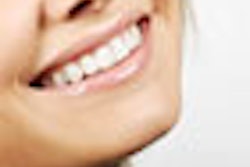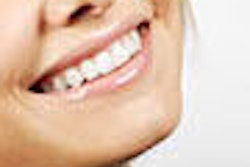It's safe. No it isn't! Yes, it is! Reading the reports about bleaching and its dangers to dental structure is like watching a ping-pong match. That's why in December two dental journals stepped in to arbitrate. And happily both agree on the winning message: bleaching is safe.
But before you celebrate by uncorking a bottle of bubbly hydrogen peroxide, bear in mind that significant warnings still come along with the brew. First, use only as directed. And second, avoid exposed dentin.
One review, published in the Journal of Dentistry, summarizes dozens of studies on the effects of hydrogen peroxide (HP) and carbamide peroxide (CP) on enamel and dentin, and concludes that "the vast majority of studies indicate that HP and CP containing products have no significant deleterious effects on enamel and dentine." The study's author, Andrew Joiner, works for Unilver Oral Care of England, which sells whitening products made with hydrogen peroxide.
The other review, published in the Journal of Esthetic and Restorative Dentistry, reaches the same conclusion about enamel. And a sequel will make similar points about dentin, the author, Edward J. Swift Jr., D.M.D., told DrBicuspid.com. "The bottom line is...that bleaching does demineralize dentin to a certain extent," he says. "But most of the studies have not taken into account the fact that saliva does a pretty good job of remineralizing."
Dr. Swift -- an associate editor of the journal and chair of operative dentistry at the University of North Carolina, Chapel Hill -- reports no current conflicts of interest, though he has in the past worked as a consultant for Procter & Gamble, which makes bleaching products.
"Most of the studies ignore the fact that saliva is in the mouth."
But questions remain to be answered, says Dr. Swift. Almost all the research has taken place in petri dishes where conditions may be very different from the human mouth. Typically, researchers measured the strength of human or cow tooth material from extracted teeth, then bleached it, then measured it again. Other studies have used images from scanning electron microscopes to see what changes bleach causes.
One enamel experiment stands out as an exception: Patients wore oral appliances embedded with enamel slabs. They removed the slabs for bleaching with 10 percent CP, then put them back in their mouths so that investigators could measure the effects of real saliva. For comparison purposes, researchers bleached similar slabs which they stored in deionized water instead of human mouths. They found that the slabs kept in water lost significant hardness, while the slabs kept in human mouths did not.
No one has yet performed a similar experiment on dentin, says Dr. Swift. Most bleaching research has focused on enamel, yet the experiments done so far suggest that dentin is more vulnerable to harm. And while some of these studies have shown that storage in artificial saliva remineralizes dentin, at least one contradicted that finding.
So what's a dentist to do? The safest bet is to avoid getting bleach directly onto dentin.
That's the advice of Laura Tam, D.D.S., an associate professor of restorative dentistry at the University of Toronto. She's not impressed by the optimistic conclusions of the recent review articles. Her research showed that applying bleach directly made dentin significantly less tough. "I still stick to that," she says. "Whenever possible, avoid bleaching dentin for prolonged periods of time."
And here -- to the relief of ping-pong weary readers -- Dr. Swift agrees. "The dentin studies have shown that direct contact has more of a dimineralizating effect," he says. For example, bleaching may not be a good idea if a patient has excessively worn tooth surfaces. Patients whose roots are exposed should not use over-the-counter-whitening kits. Instead, they should ask their dentists to construct trays that don't reach the exposed dentin.
The warning about exposed dentin is one that not many patients -- or even dentists -- have heard, says Dr. Swift. "I think most of them have no idea that could be an issue."



















